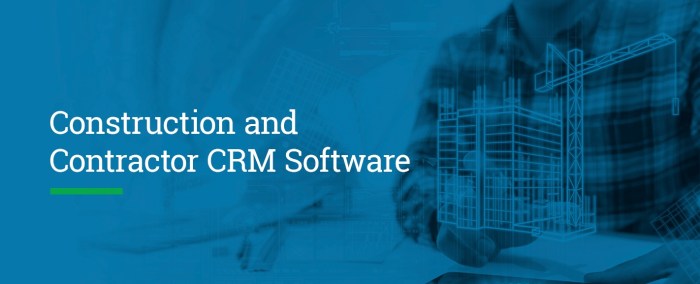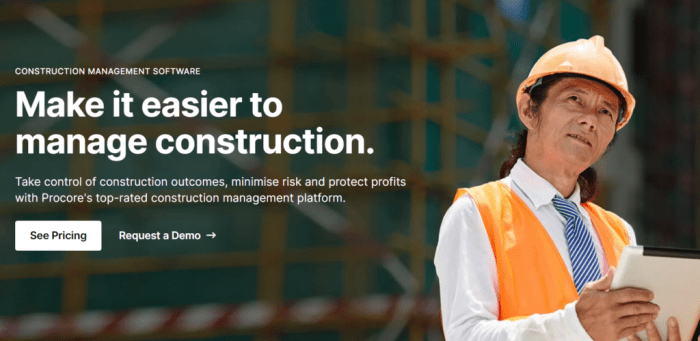Crm software for construction companies – The construction industry is known for its complexity, involving intricate projects, multiple stakeholders, and demanding timelines. Effective project management and client communication are paramount to success. This is where a robust Customer Relationship Management (CRM) system steps in, transforming how construction companies operate and fostering growth. This comprehensive guide explores the vital role of CRM software specifically tailored for construction companies, outlining its benefits, key features, and implementation strategies.
Why Construction Companies Need CRM Software
Construction projects are inherently multifaceted. Managing client relationships, tracking leads, coordinating subcontractors, and monitoring project progress requires meticulous organization and efficient communication. Traditional methods, such as spreadsheets and email chains, often prove inadequate, leading to inefficiencies, miscommunication, and missed deadlines. A dedicated CRM system addresses these challenges by centralizing crucial information, automating tasks, and improving collaboration across teams.
Key Benefits of Implementing a Construction CRM:, Crm software for construction companies
- Enhanced Client Relationship Management: Centralized client information, including contact details, project history, communication logs, and payment records, allows for personalized service and stronger client relationships. This fosters loyalty and repeat business.
- Improved Lead Management: Track leads from initial inquiry to project completion, ensuring no potential opportunity is missed. Automate lead nurturing processes, improving conversion rates.
- Streamlined Project Management: Monitor project progress, track milestones, manage tasks, and collaborate with subcontractors efficiently. Reduce delays and improve project profitability.
- Better Communication & Collaboration: Facilitate seamless communication between project managers, subcontractors, clients, and other stakeholders through centralized communication channels. Reduce confusion and misunderstandings.
- Increased Efficiency & Productivity: Automate repetitive tasks such as scheduling, reporting, and invoicing, freeing up valuable time for strategic initiatives.
- Data-Driven Decision Making: Access real-time data and analytics to gain valuable insights into project performance, client behavior, and overall business operations. Make informed decisions to optimize processes and improve profitability.
- Improved Reporting & Financial Management: Generate accurate and timely reports on project costs, revenue, and profitability. Improve financial forecasting and control.
Essential Features of a Construction CRM
Not all CRMs are created equal. A successful implementation requires selecting a system with features specifically designed for the construction industry. Look for these key functionalities:

Source: simplesalestracking.com
Must-Have Features:
- Contact Management: Detailed contact profiles for clients, subcontractors, suppliers, and other stakeholders.
- Lead Management: Tools for tracking leads, assigning them to sales representatives, and nurturing them through the sales pipeline.
- Project Management: Features for scheduling tasks, tracking progress, managing budgets, and collaborating with team members.
- Document Management: Centralized storage and access to project documents, blueprints, contracts, and other relevant files.
- Communication Tools: Integrated communication channels, such as email, instant messaging, and video conferencing, to facilitate seamless collaboration.
- Reporting & Analytics: Customizable reports and dashboards to track key performance indicators (KPIs) and gain insights into business performance.
- Integration Capabilities: Seamless integration with other business applications, such as accounting software, project management tools, and estimating software.
- Mobile Accessibility: Access to the CRM system from any device, allowing for real-time updates and communication on the go.
- Customizable Workflows: Ability to tailor the CRM system to meet the specific needs and processes of your construction company.
- Bidding & Estimating Integration: Streamlining the bidding process and integrating cost estimations directly into the CRM.
Choosing the Right CRM for Your Construction Business
Selecting the appropriate CRM involves careful consideration of your company’s size, budget, specific needs, and technological capabilities. Consider these factors:
Factors to Consider:
- Scalability: Choose a CRM that can grow with your business, accommodating increasing numbers of projects, clients, and employees.
- Budget: Evaluate the cost of the CRM software, including licensing fees, implementation costs, and ongoing maintenance.
- Integration Capabilities: Ensure the CRM integrates seamlessly with your existing software systems.
- User-Friendliness: Select a CRM that is intuitive and easy to use for all employees, regardless of their technical expertise.
- Customer Support: Choose a vendor that provides excellent customer support and training.
- Security: Ensure the CRM system offers robust security features to protect sensitive client and project data.
Implementing a Construction CRM: A Step-by-Step Guide
Successful CRM implementation requires careful planning and execution. Follow these steps for a smooth transition:
Implementation Steps:
- Needs Assessment: Identify your company’s specific needs and requirements for a CRM system.
- Vendor Selection: Research and select a CRM vendor that meets your needs and budget.
- Data Migration: Transfer existing client and project data to the new CRM system.
- User Training: Provide comprehensive training to all employees on how to use the CRM system.
- System Customization: Customize the CRM system to meet your company’s specific workflows and processes.
- Ongoing Monitoring & Optimization: Continuously monitor the performance of the CRM system and make adjustments as needed.
Frequently Asked Questions (FAQ): Crm Software For Construction Companies
Here are some frequently asked questions about CRM software for construction companies:
- Q: What is the cost of CRM software for construction companies? A: The cost varies depending on the features, scalability, and vendor. Expect a range from affordable cloud-based solutions to more expensive enterprise-level systems.
- Q: How long does it take to implement a CRM system? A: Implementation time depends on the complexity of the system and the size of your company. It can range from a few weeks to several months.
- Q: What are the benefits of using a cloud-based CRM? A: Cloud-based CRMs offer accessibility from anywhere, automatic updates, scalability, and reduced IT infrastructure costs.
- Q: How can I ensure data security with a CRM system? A: Choose a vendor with robust security features, including encryption, access controls, and regular backups. Implement strong password policies and employee training on data security best practices.
- Q: What are some popular CRM options for construction companies? A: Many options exist, including industry-specific solutions and adaptable general-purpose CRMs. Research options like Salesforce, HubSpot, Zoho CRM, and others to find the best fit.
References
For further reading and research, consider these resources:
- Salesforce Construction Solutions
- HubSpot CRM
- Zoho CRM
- (Add other relevant links here as needed)
Call to Action
Ready to transform your construction business with the power of a CRM? Contact us today for a free consultation and let us help you find the perfect solution to streamline your operations and achieve greater success.

Source: psdcenter.com
Common Queries
What are the key features of CRM software for construction companies?
Key features often include contact management, project management tools, document storage, reporting and analytics, and potentially integration with other construction-specific software.
How much does CRM software for construction companies cost?
Pricing varies greatly depending on the features, number of users, and vendor. Expect a range from affordable monthly subscriptions to more substantial enterprise-level solutions.
What is the best CRM software for a small construction company?
The “best” CRM depends on specific needs. Some user-friendly options for smaller companies include those with intuitive interfaces and affordable pricing plans. Research and compare features before selecting a system.

Source: kohezion.com
How long does it take to implement CRM software?
Implementation time varies, depending on the complexity of the system and the company’s size. Expect a period of several weeks to months for complete setup and training.
Can CRM software integrate with my existing accounting software?
Many CRM systems offer integration capabilities with various accounting software packages. Check for compatibility with your specific software before purchasing a CRM.
